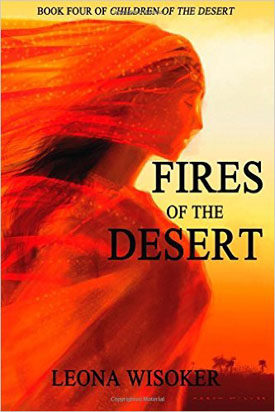 Fires of the Desert is Book Four of Leona Wisoker’s series, Children of the Desert, and, just when you thought things couldn’t get more complex and difficult, they do, although thankfully the darkness of Bells of the Kingdom is ameliorated.
Fires of the Desert is Book Four of Leona Wisoker’s series, Children of the Desert, and, just when you thought things couldn’t get more complex and difficult, they do, although thankfully the darkness of Bells of the Kingdom is ameliorated.
The geographic center of this one is Bright Bay, seat of King Oruen of the Northern Kingdom, only recently on his throne. The character focus is rather more complex: most of the story centers on Lord Alyea Peysimun, the newly minted desert lord who is still coming into her powers; Deiq of Sass, the First Born ha’ra’ha, Alyea’s mentor and lover, who most think is merely a rich merchant; Lord Eredion Sessin, the Sessin Family factor on Bright Bay — and so far, the only Family representative; and Tank, the young red-haired mercenary of uncertain antecedents, who is much more than he seems or wants to be.
The surface story is about the politics, and there’s a lot of politics — the desert Families and their relationship with King Oruen; the Teyanin and their head, Lord Evkit, who has a finger in everything and is facing his own difficulties; Alyea herself, scion of a Northern family who is now, willy-nilly, part of the South; Eredion’s balancing act between easing the transition to the new regime in Bright Bay and the demands of his own Family; the interest of certain parties in drawing Tank into their doings. That’s just the surface.
On another level, this is a coming-of-age-story, for Tank, for Alyea, and even for Deiq, who among other things is half human and has never learned how to be. This is where Wisoker’s facility with character comes most into play: Even though we are dealing with people who are sometimes not completely human, they are people who grow and change, and we see it happening. It’s immensely rewarding.
All of which is by way of an admittedly feeble description of one of the most complex and engaging novels it has been my pleasure to read in a long time. Although I shy away from subjective comments in these reviews, I have to admit that Wisoker has managed to do all the things I like in fiction: the settings are not cluttered up with detail but are rendered economically and vividly; the characters, likewise, are sketched cleanly and filled in as the story progresses; the events are sometimes surprising, but when we stop to think about it we can see that they have grown organically out of the milieu and personalities. And Wisoker is not hitting us over the head with it: I’ve long maintained that an artist is only responsible for half of the experience, and that the audience is responsible for the other half. She’s left us room to do our part as readers, leading to a level of engagement that is all too rare, and much appreciated: it makes reading the novel that much more enjoyable.
The ending of this one might have been problematic, but I am assured that the next book is in the works even as I write this review. I want to see where Alyea and Deiq go from here, I want to see how Tank comes to terms with his heritage, and I want to see how Eredion decides to live the rest of his life. I can tell one thing, though: it’s going be a lot of fun finding out.
A note: Even though at this point it’s a massive series, I highly recommend making Children of the Desert your summer reading. The series is complex and multi-layered enough that if you leave it for too long, you’re going to be lost and will have to go back and refresh your memory. Not that that’s a bad thing — I think this one will stand up to re-reading just fine.
(Mercury Retrograde Press, 2013)
